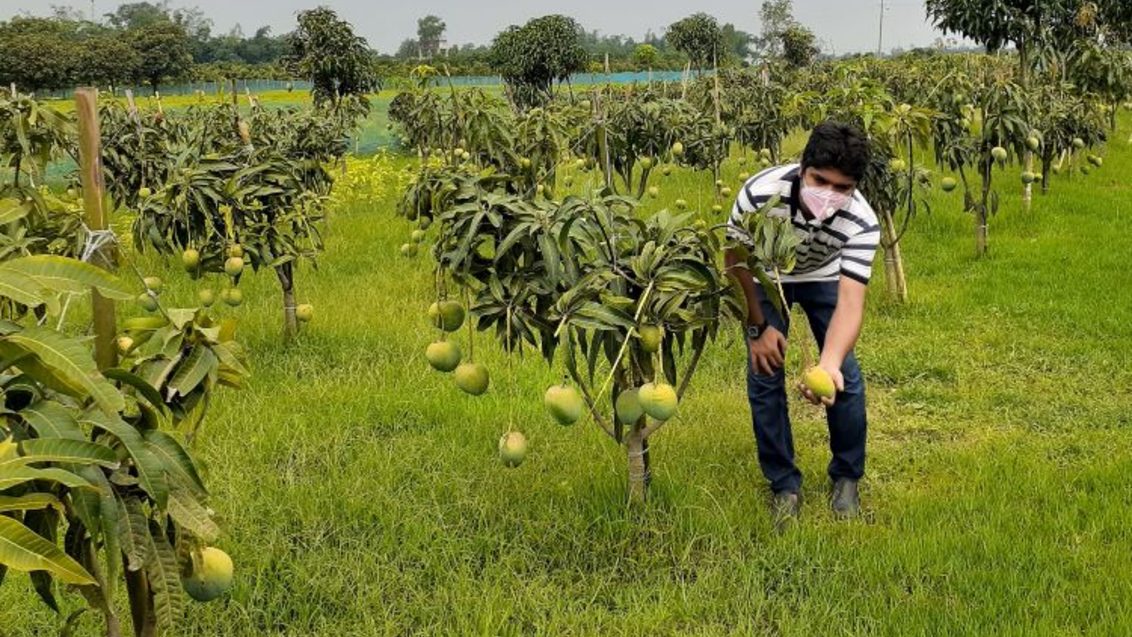Less water, more income – that’s the idea

Farming needs to get climate-smarter and more resilient. For smallholders, that’s easier said than done. The IWET program combines the prospet of water-saving with better income. Having proved the concept, it’s now time to increase adoption.
Many people think of Bangladesh battling with too much water rather than too little. Some regions, however, are drought-prone. They include the Barind Tract in the northwest. «Groundwater levels there are declining; continuous extraction is leading to desertification», says Shahinur Islam from our local team. Average rainfall is 1200mm, but with none for most of the year. Outside the monsoon season, farmers rely on flood irrigation. «Unfortunately, Bangladesh has the least efficient irrigation in South Asia», adds Shahinur. «The resulting costs make a lot of farm produce uncompetitive.»
IWET aims to tackle these issues: Introducing Water-Efficient Technologies in Barind Tract*. Our Foundation and expert partners came forward to design the project and implement it on the ground. IWET is sponsored by the Coca-Cola Foundation, coordinated by the 2030 Water Resource Group (2030WRG) and jointly implemented by SFSA Bangladesh and DASCOH.
«IWET is all about improving both water usage efficiency and farm income», emphasizes Syeda Sitwat Shahed from 2030WRG Bangladesh. «To achieve this, we want to increase farmers’ use of modern drip irrigation technology». Some 10,000 Barind Tract smallholders stand to gain.
«IWET is an excellent example of a direction we’ll increasingly be taking throughout the Foundation», comments our R&D Lead Dominik Klauser. «Our aim is to help smallholder agriculture become climate-smarter and more resilient.»
Ajay Bathija says: «Water and sustainable agriculture create a business imperative that complements our ethical drive – working to ensure sustainability everywhere we operate». Bathija is the Country Manager, Coca-Cola Bangladesh Limited. «We are working on IWET to build farmers’ adaptive capacity and resilience, increase their income through crop diversification and a gradual shift to high-value, less water-intensive crops.»
It’s the combination that counts
Saving water is laudable. But financial advantages make it much more attractive. IWET’s first drive is for smallholders to earn good incomes with mangoes. The Barind Tract already has a good reputation for this crop, but groundwater depletion puts much of it at risk. The IWET focus is thus on ‘Ultra-High-Density’ (UHD) mango-growing with drip irrigation.
This method offers multiple advantages. «Drips save up to 70% of the water used in flood irrigation», notes Shahinur Islam. «They also enable far more efficient fertilizer use than conventional hand application. Drip irrigation waters the mangoes very specifically, which means fewer weeds than with the flood method. That reduces weeding work and avoids unnecessary tillage. Further great news is that the equipment runs for up to 25 years.»
These efficiencies are a good start. But the IWET shift also makes cropping sense. «The UHD approach enables over ten times as many trees per acre, earlier and easier harvesting, plus up to 300% higher yields», explains our Bangladesh Country Director Farhad Zamil. «The small trees allow careful hand-picking. That’s good for quality and reduces losses during and after harvest.» (See our photo). Local mango processors are correspondingly enthusiastic.
An important catalyst for IWET are the Farmers’ Hubs, established across Bangladesh with help from our Foundation. Some 20 in the Barind Tract are serving mango-growers in a range of ways. «The Hubs provide inputs, guidance on cultivation management and links to the market», Farhad sums up. The inputs include mango saplings as well as locally made drip irrigation and ‘fertigation’ equipment. Government, companies and international experts help with the technology management.
Despite all these efforts, however, popularizing drip irrigation remains an uphill task. It requires investment and a change from traditional practice. The uncertainties of the past pandemic year have understandably made smallholders even more risk-averse. «Increasing the adoption of drip technology is a major priority for us now», declares Shahinur Islam. «As well as bringing the price down, and enabling Farmers’ Hubs to stock spare parts, we’re also working with local government on an awareness campaign. Farmers who have successfully switched will also be important ambassadors – seeing a neighbour do better is always a big motivation!»
*IWET was developed under the Bangladesh Water Multi-Stakeholder Partnership, the public/private/civil society platform to address water-related challenges.
